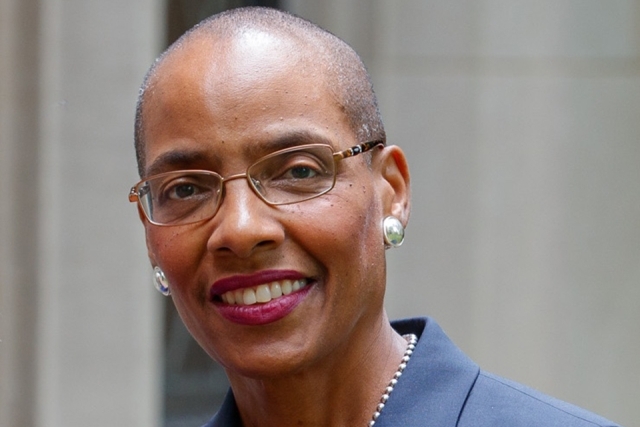
The United States must face the idea that it was founded as a White supremacist nation, according to a keynote speaker for the third installment of “Women of Color in the Academy,” the 2020–21 Vincentian Chair of Social Justice lecture series.
“That is in the DNA of this country, and we need to recognize and be honest about it. Anglo-Saxon exceptionalism was American exceptionalism, and American exceptionalism was Anglo-Saxon exceptionalism,” said The Very Rev. Kelly Brown Douglas, Ph.D., Dean of the Episcopal Divinity School at Union Theological Seminary, during her virtual address, “A Journey of Faith: From Crucifying Death to Resurrection Hope.” The Vincentian Center for Church and Society (VCCS) hosted the event.
“This lecture reflects a testimonial of personal faith as I seek to explore what it means to have faith in Jesus Christ during a time of Black death and Black protest—a time when it seems as if Black lives never will come to matter,” Dean Douglas explained.
“As a scholar, minister, and preacher, Dean Douglas powerfully unites the social Gospel with the Gospel of engagement and confrontation,” said Rev. Patrick J. Griffin, C.M., Executive Director of the VCCS, who introduced Dean Douglas.
“Race and religion cannot be comfortable and separable realities. Dean Douglas’s challenge of the need for the Black Christ in the White Church can cause many of us to ask questions that have not arisen before.”
Dean Douglas affirmed the viewpoint that White Christians should adopt the perspective of the Black Christ in order to demonstrate an alliance with Black Christians. “Images and icons of the Black Christ do not only belong in Black churches. In fact, it is as important, if not more so, that they are placed in White churches,” she said.
Noting that the sole Black image that is often seen in White churches is of Jesus’s betrayer, Judas, she stressed, “If you are going to change the narrative of Blackness as being a cauldron of evil to one that affirms the sacredness of Black bodies, then you need to present divine images that depict that sacredness.”
Doing so will help White congregations to begin to see Black bodies differently “and not have instinctive, negative responses to Black bodies,” she said. “Blackness is often seen as that which is diametrically opposed to that which is good.”
This approach will also correct what Dean Douglas noted as the theologically incorrect depiction of Christ as being a White man. “If nothing else, let’s get this historically correct and present images that represent the Palestinian, Jewish man who was Jesus Christ.”
Moreover, Christ’s crucifixion profoundly made clear to Black people that Jesus is one with them, the Dean said. “It is through the cross that Jesus identifies with the pain and suffering of Black people.”
Quoting American theologian James H. Cone, she added, “Through the cross, Jesus makes an unqualified identification with the poor and helpless and takes their pain upon himself.”
The cross, however, does not sanctify the sacrifice of Black life, the Dean said. “Quite the contrary. The very fact that Black lives are victims of crucifying death is an affront to God’s very vision and promised future. The way to a new moral imaginary that centers on Black life is not the way of Jesus’s death on the cross, but the way of his resurrected life.”
At one point, Dean Douglas was asked by a young White woman what steps she can take to initiate significant change for more justice and equality.
“Just because you look like a White American does not mean you have to act like one,” the Dean responded. “To be White does not mean that you have to accept the privileges of what it means to be White.”
The Dean advised the woman to work on “intentionally” recognizing the privileges she enjoys simply because of her race, and to name those privileges, so that she can begin to see “that it is no longer acceptable to be willfully ignorant of what it means to walk through this world as a White person. It is easy to be White in America.”
The theologian shared her own crisis of faith as the Black Lives Matter movement erupted last summer and numerous protests were held throughout the US. “As assaults on Black lives continued, even during Black Lives Matter protests, I found my faith waning,” she recalled.
But a spontaneous decision to join a Black Lives Matter demonstration in Washington, DC, gave her a change of heart. She went to Black Lives Matter Plaza, located on 16th and K streets, and encountered a racially diverse crowd of exuberant protestors that included Black, White, Brown, Asian, and Latinx, and individuals of every age.
“It was there, in the midst of a mosaic of people witnessing that Black lives matter with music, singing, and chanting ‘This is what democracy looks like!’ that something happened,” she recalled. “I found myself laughing, and it felt transcendent.”
“There was no greater witness of hope than those protesters, in the face of anti-Black, White supremacy, who came out to protest in the middle of a raging pandemic, in support of the just life that God promises us all,” said Dean Douglas. “To laugh is a signal of transcendence. It signals the discrepancy between our unjust earth and God’s just future.”
